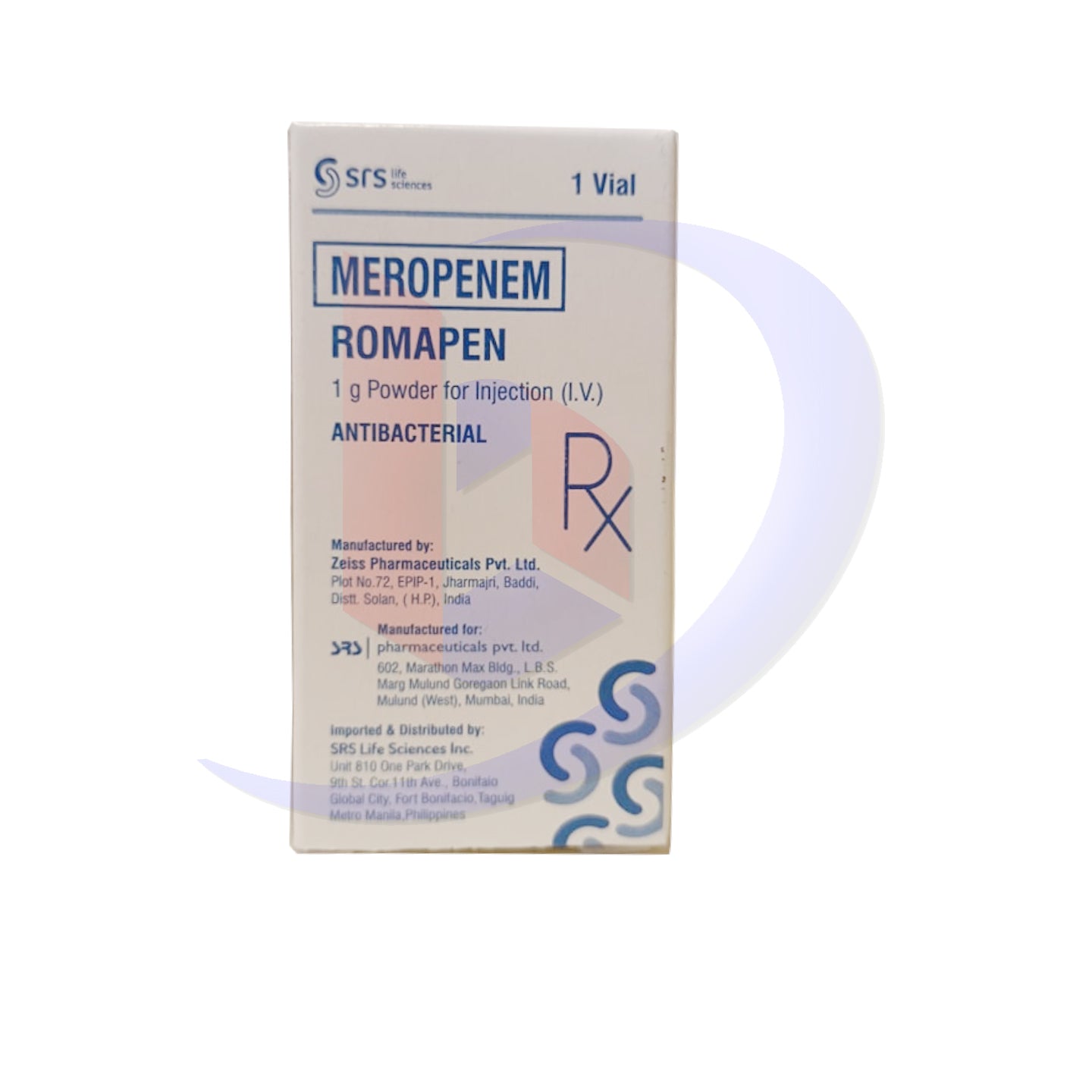Bambang Pharmaceutical Depot Inc.
Meropenem (Romapen) 1g Powder for Injection I.V Vial 1's
Meropenem (Romapen) 1g Powder for Injection I.V Vial 1's
Couldn't load pickup availability
1g Powder for Injection I.V
ANTIBACTERIAL
Certainly! Here is the detailed information for Meropenem (Romapen) 1g Powder for Injection I.V. Vial 1's:
Product Description:
Romapen (Meropenem 1g) is an antibiotic that belongs to the carbapenem class. Each vial of Romapen contains 1g of Meropenem in powder form, which is reconstituted and administered via intravenous (I.V.) injection or infusion. Meropenem is a broad-spectrum, b-lactam antibiotic effective against a wide range of gram-positive, gram-negative, and anaerobic bacteria. It works by inhibiting bacterial cell wall synthesis, leading to bacterial death.
-
Romapen (Meropenem) is a sterile powder that, when mixed with an appropriate diluent, is injected directly into a vein to treat serious infections.
-
It is generally used in the hospital setting for severe infections that require parenteral administration.
Indications:
Romapen (Meropenem) is used to treat a wide variety of serious bacterial infections, including those caused by both aerobic and anaerobic organisms. It is typically used for infections that are resistant to other antibiotics. The common indications include:
-
Intra-abdominal Infections:
-
Peritonitis (inflammation of the abdominal lining)
-
Complicated appendicitis
-
Intra-abdominal abscesses
-
-
Respiratory Tract Infections:
-
Pneumonia (including hospital-acquired pneumonia and ventilator-associated pneumonia)
-
Bronchitis
-
Exacerbations of chronic obstructive pulmonary disease (COPD)
-
-
Urinary Tract Infections:
-
Complicated urinary tract infections (cystitis, pyelonephritis)
-
-
Skin and Soft Tissue Infections:
-
Complicated skin and soft tissue infections (e.g., diabetic foot infections, wound infections)
-
-
Meningitis: Meropenem can be used in the treatment of bacterial meningitis, especially in patients with multi-drug-resistant infections.
-
Sepsis: It is used for the management of sepsis and bacteremia, including infections caused by resistant organisms.
-
Bone and Joint Infections: Osteomyelitis (bone infection) and septic arthritis can be treated with Meropenem in cases where broad-spectrum antibiotic coverage is required.
Dosage:
Romapen (Meropenem) is administered intravenously. The dosage depends on the type and severity of the infection, the patient's age, renal function, and overall condition. The typical dosing guidelines are as follows:
For Adults (including elderly patients):
-
Standard Dose: The usual adult dose is 1g every 8 hours.
-
Severe Infections: In more severe infections, the dose can be increased to 2g every 8 hours.
-
Duration of Treatment: The duration of therapy depends on the severity of the infection and clinical response. Treatment is generally continued for 7 to 14 days or until the infection is controlled.
For Children:
-
The dose for pediatric patients is typically 10-20 mg/kg every 8 hours, depending on the severity of the infection.
For Renal Impairment:
-
In patients with renal impairment, the dosing interval may need to be adjusted based on the degree of renal function impairment.
-
For patients with creatinine clearance less than 51 mL/min, the dose interval may be prolonged to 12 hours or longer.
Side Effects:
Meropenem is generally well-tolerated, but like any antibiotic, it can cause side effects. The common and serious side effects include:
Common Side Effects:
-
Gastrointestinal disturbances: Nausea, vomiting, diarrhea, abdominal pain.
-
Phlebitis (inflammation at the injection site): Pain, redness, or swelling at the IV site.
-
Headache: Some patients may experience headaches during treatment.
-
Rash: A mild skin rash or allergic reaction.
Serious Side Effects (Less Common):
-
Allergic reactions: Including anaphylaxis (severe allergic reaction), angioedema (swelling under the skin), or urticaria (hives).
-
Severe gastrointestinal reactions: Including Clostridium difficile-associated diarrhea (CDAD), a life-threatening condition caused by an overgrowth of certain bacteria in the intestines.
-
Seizures: Rare, but can occur, particularly in patients with renal impairment or those who have high doses of Meropenem.
-
Hematologic effects: Including anemia, leukopenia (low white blood cells), thrombocytopenia (low platelets), and eosinophilia (high levels of eosinophils in the blood).
-
Liver abnormalities: Elevated liver enzymes (AST, ALT), jaundice, and other signs of liver dysfunction can occur.
-
Renal impairment: Rare but possible, especially in patients with pre-existing kidney issues.
If any of these serious side effects occur, contact a healthcare provider immediately.
Contraindications:
Meropenem (Romapen) should not be used in the following situations:
-
Hypersensitivity to Meropenem or other carbapenem antibiotics or any of the excipients in the formulation.
-
If you have a known allergy to penicillin or other beta-lactam antibiotics, you may be at risk of cross-reactivity with Meropenem.
-
-
History of severe allergic reactions to beta-lactam antibiotics: Patients with a history of anaphylaxis or severe hypersensitivity reactions to penicillins or cephalosporins should not use Meropenem.
-
Severe renal impairment without dose adjustment: Patients with severe renal dysfunction (creatinine clearance less than 30 mL/min) should only receive Meropenem under careful monitoring and with proper dose adjustments.
-
Pregnancy and lactation: Although Meropenem is classified as a Category B drug for pregnancy (based on animal studies), it should only be used during pregnancy if clearly needed. It is also excreted in breast milk, so caution should be exercised when administering to breastfeeding women.
-
Infants with CNS disorders: Special caution is required when administering to infants with CNS issues, as Meropenem can rarely cause seizures.
Precautions:
-
Renal Function: Meropenem is eliminated by the kidneys. Therefore, in patients with renal insufficiency, the dose and frequency of administration may need to be adjusted.
-
Seizure Risk: Although rare, Meropenem may increase the risk of seizures, particularly in those with a history of neurological disorders or renal dysfunction. Close monitoring is advised.
-
Gastrointestinal Issues: Meropenem can cause C. difficile-associated diarrhea (CDAD), particularly after prolonged treatment. If diarrhea is severe or persistent, the drug should be discontinued, and appropriate treatment for CDAD should be started.
-
Superinfection: Prolonged use of Meropenem may lead to overgrowth of non-susceptible organisms (e.g., fungi), which could cause superinfection. Monitoring and adjustment of therapy may be required.
-
Pregnancy and Lactation: Meropenem should only be used in pregnancy if the potential benefit justifies the potential risk to the fetus. It is excreted in breast milk, so breastfeeding should be either avoided or closely monitored.
Drug Interactions:
-
Probenecid: Concomitant administration of probenecid can reduce the renal excretion of Meropenem, leading to higher plasma concentrations. This may increase the risk of toxicity, and the combination should be used with caution.
-
Other antibiotics: The effectiveness of Meropenem can be influenced by other antibiotics, especially those affecting the same bacterial targets. Monitoring and possible adjustments in therapy may be necessary.
-
Anticoagulants: Some studies suggest that antibiotics like Meropenem may affect the metabolism of warfarin (an anticoagulant), potentially leading to an increased risk of bleeding.
Summary:
Romapen (Meropenem 1g) is a broad-spectrum carbapenem antibiotic used to treat severe bacterial infections such as pneumonia, urinary tract infections, skin infections, sepsis, and meningitis. It is typically administered intravenously and is effective against both gram-positive and gram-negative bacteria.
-
The typical dosage for adults is 1g every 8 hours, though it may be increased for more severe infections.
-
Common side effects include gastrointestinal disturbances, rash, and headache, while serious side effects may include seizures, allergic reactions, and gastrointestinal complications.
-
Romapen should not be used in patients with severe renal impairment, allergic reactions to beta-lactam antibiotics, or those who are pregnant or breastfeeding unless absolutely necessary.
Always follow the healthcare provider's instructions, especially for dosage and administration, and report any side effects promptly.
Share

Product Features
Highlights
Details
Lot #
Expiry Date
"For All Your Pharma And Medical Supply Needs"
-
MEDICINES
We offer large range of generics and branded tablets, capsules, topicals, suppositories, drops or suspensions, inhalers and injections.
-
SUPPLEMENTS
High quality yet very affordable vitamins and minerals, specialty supplements, herbals and botanicals, sports nutrition, and weight management.
-
MEDICAL SUPPLIES
We serve all types of medical supplies needed in clinics, laboratories, and hospitals like cottons, gauze, alcohol, swabs, gloves, bandages, lancets, glucometer, etc.
-
MEDICAL EQUIPMENT
We also serve durable and affordable medical devices and equipment needed in clinics, laboratories and hospitals.
Subscribe to our emails
Be the first to know about new collections and exclusive offers of Bambang Pharmaceutical Depot Inc.


